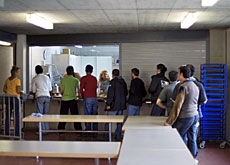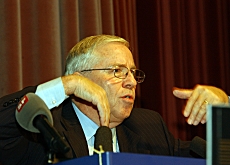Tougher asylum law rankles UN

The United Nations and humanitarian agencies have strongly condemned government plans to tighten the country's asylum laws, which go to the vote on September 24.
The UN refugee agency (UNHCR) has repeatedly criticised the new legislation since it was put out for consultation in 2004, saying it runs contrary to the 1951 Geneva refugee convention.
Having made its position abundantly clear over the past two years, the UN agency declared this month that it would not be participating in the pre-referendum campaign run by opponents.
“The positions taken by UNHCR in the past are publicly available… and these concerns still exist,” Hans Lunshof, who is responsible for Swiss affairs, told swissinfo.
Under the government’s proposals, social welfare payments would be denied to rejected asylum seekers. In addition, those who fail to present identity papers within 48 hours would be expelled and the maximum detention period for those awaiting deportation would be raised to 24 months.
The revised asylum law would also rule out the granting of admission to asylum seekers on humanitarian grounds but would make it easier for those who are successful to work and to be joined by their families.
The changes were approved by parliament in December but were challenged by a coalition of centre-left parties, church groups and aid organisations, which collected enough signatures to force a referendum.
Reservations
The UNHCR first expressed reservations to the new asylum law in July 2004 during the informal consultation process. The organisation said some of the measures submitted by the former Federal Refugee Office ran contrary to the “spirit and letter” of the 1951 Geneva refugee convention.
In September last year, shortly after both houses of parliament had approved the new asylum law, the UNHCR again voiced “serious concerns”.
“We are disappointed that despite the continuous decline in the numbers of asylum requests over the past few years in Switzerland, a new law has been adopted that could make asylum procedures excessively difficult for real refugees,” said UNHCR spokesman Ron Redmond at the time.
He said the UN body was particularly worried that only valid travel documents or identity papers would be accepted.
“The fact of not having documents is recognised by the 1951 convention. It is not an unusual situation. This [planned] measure is among the most severe in Europe,” Redmond said.

More
Referendum
Refugee convention
Violation of the refugee convention is also one of the key concerns of Amnesty International, which is part of the 36-strong “Coalition for a Humanitarian Switzerland” that forced this month’s nationwide vote.
“This new paragraph saying asylum seekers have to present valid papers within 48 hours goes much too far. We know that 40 per cent of the world’s population do not have any identity papers, and people fleeing persecution just cannot be expected to have them,” said spokesman Jürg Keller.
According to Amnesty, such a measure would lead to more asylum seekers being returned home to face torture or imprisonment. The organisation says it has proof of at least eight to ten cases where this has occurred.
“I hope people see that all this talk of abuses is pure fabrication. There are not as many as the government and centre-right parties say,” added Keller. “This really is a minor problem and there is a danger of sending back people who need our protection.”
The Swiss Red Cross, which is not a member of the coalition, has also adopted a strong line against the proposed legislation. For the first time in its history the organisation took out adverts in the Swiss press in July and August to get its message across.
Beat Wagner, head of communications, told swissinfo that if the electorate approved tighter legislation, it would undoubtedly lead to more hardship cases.
He pointed out that many rejected asylum seekers dared not ask for emergency assistance for fear that contact with the authorities might lead to detention or expulsion.
swissinfo, Adam Beaumont
The UNHCR has been quick to condemn tighter laws on foreigners and asylum in the past.
In 2003, ahead of parliamentary elections, the UN agency slammed the rightwing Swiss People’s Party for stoking up prejudice via a provocative advertising campaign. The People’s Party responded by telling the UNHCR to keep its nose out of Switzerland’s internal affairs.
In 2004 the agency attacked plans by Justice Minister Christoph Blocher to set up refugee camps abroad to stem the flow of asylum seekers.
The number of asylum seekers has fallen by 12.5% since the asylum law was last revised in April 2004.
Since then rejected asylum seekers have only received aid in emergency cases.
2,235 asylum-seekers were rejected last year, compared with 4,450 during 2004.

In compliance with the JTI standards
More: SWI swissinfo.ch certified by the Journalism Trust Initiative



You can find an overview of ongoing debates with our journalists here. Please join us!
If you want to start a conversation about a topic raised in this article or want to report factual errors, email us at english@swissinfo.ch.